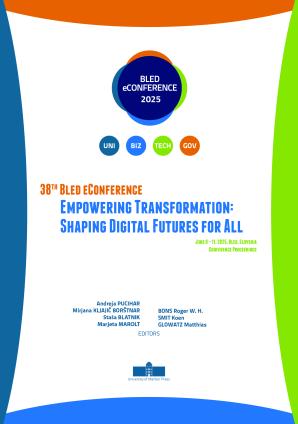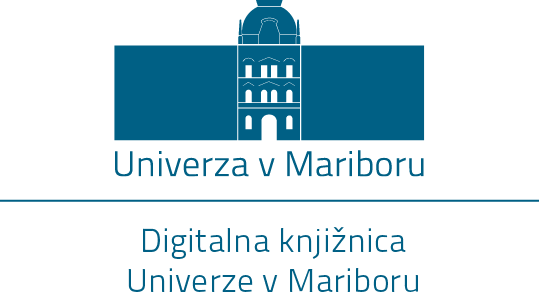38th Bled eConference: Empowering Transformation: Shaping Digital Futures for All: Conference Proceedings
Ključne besede:
odpornost, digitalna preobrazba, digitalne inovacije, dvojni prehod, trajnost, zelena preobrazba, oblikovanje digitalne prihodnostiKratka vsebina
38. mednarodna Blejska eKonferenca: Omogočanje preobrazbe: Oblikovanje digitalne prihodnosti za vse: Zbornik konference. Blejska eKonferenca, ki jo organizira Univerza v Mariboru, Fakulteta za organizacijske vede, že od leta 1988 sooblikuje razvoj elektronskega, danes digitalnega poslovanja in digitalne družbe. Tema 38. konference je »Omogočanje preobrazbe: Oblikovanje digitalne prihodnosti za vse«. Osrednja tema izpostavlja potrebo po digitalni preobrazbi, ki je usmerjena v dobrobit človeka in družbe kot celote. Poudarjamo pomen vključujočega in trajnostnega razvoja, ki omogoča enakopravno udeležbo različnih deležnikov pri oblikovanju digitalne prihodnosti za vse, zasnovane na etičnih, družbenih in trajnostnih temeljih. V tem okviru so digitalne tehnologije sredstvo za preoblikovanje obstoječih sistemov in rešitev, ki bodo naravnane na človeka. Z rešitvami želimo spodbujati razvoj inovacij, krepitev odpornosti ter ustvarjanje dolgoročnega družbenega in gospodarskega napredka. Prispevki v tem zborniku konference raziskujejo vrsto tem, vključno s priložnostmi in izzivi dvojnega prehoda, novimi digitalnimi tehnologijami, umetno inteligenco in podatkovno znanostjo, odločitveno analitiko za poslovne in družbene spremembe, digitalnimi inovacijami in poslovnimi modeli, prestrukturiranim delom in delovnim mestom prihodnosti, digitalnim zdravstvom, digitalno etiko, digitalnim izobraževanjem, pametnimi in trajnostnimi mesti, digitalnimi potrošniki in digitalno preobrazbo javnega sektorja.
Poglavja
-
Towards a Taxonomy for Digital Assistant Technologies: Addressing the Jingle-Jangle Fallacies
-
Bridging Cyber Resilience and IT Business Value: A Longitudinal Bibliometric Analysis
-
Digitalization as a Catalyst for Resilience in the Hospitality Sector
-
Framing Knowledge: Enhancing Communication Strategies in the Dutch Second-hand Clothing Industry
-
Where is Emotion? Comparing Emotion Mapping Technologies
-
Business Benefits and Customer Perceptions in Customer Service Chatbots
-
Aligning Chatbot Features with Industry Needs: A Comparative Study of User Expectations in Utilitarian and Hedonic Sectors for SMEs
-
Using Video Segmentation for Unsupervised Industrial Opitcal Production Control – Case Study for the SmartFactory@OST
-
Assessing the Impact of Chatbots on Customer Service Efficiency: A Comparative Study with Human Agents
-
Explainable Digital Twins of Patients: Towards Precision and Personalisation through Cohort Matching
-
Technological Frames and Learning Experiences: Students' Interpretations of Rule-Based Chatbots in Higher Education
-
Value Co-creation Through Digitalisation: From a Micro-level to a Meso-level Approach
-
"Dear Applicant, the AI Will See you Now!" Job Applicants' Reactions to AI-Enhanced Selection
-
Preventing Unauthorized Use of Personal Data in Ghostbots Post-Mortem: An Access and Authorization Model for Digital Wills
-
Analyzing the Determinants of Healthcare Technology Adoption Using the Task-Technology Fit (TTF) Model: A Systematic Review and Meta-Analysis
-
Exploring the Maturity of Smart Public Governance: Evidence from Two Policy Sectors in Slovenia
-
Advanced RAG-LLM Prototype AI on PubMed for Cardiac Health
-
Shaping Participation: How Digital Platform Design Influences User Participation
-
The Construction of Soft Skills Scale Targeted Generation Z For IT Sector
-
Barriers to the Adoption of Digital Health Solutions Among Type 2 Diabetic Patients During the COVID-19 Pandemic
-
AI's Role in Collaborative Learning Settings in Higher Education – A Systematic Review
-
“Rage Against the Machine?”: The Impact of Clinical Decision Support Systems on Hospital Nursing Decision-Making, Workflow Efficiency, and Patient Outcomes: A Rapid Review
-
AI-Based Business Model Innovation: A ChatGPT Integration Approach
-
Virtual Care Centers and the Evolving Role of Nurses
-
The Cost-Benefit Analysis of Digital Timestamping in Maritime Logistics: The Case of Aikatieto
-
Green(ing) of Transport Chains: Implications to Business Models
-
Digitalization Meets Circular Economy
-
Developing DigiWish: The Co-Creation of a Visual Strengths-Based Training Tool for Digital Skills
-
Students’ Usage of GenAI in Universities of Applied Sciences: Experiences and Development Needs for Guidance and Support
-
LLM Pipeline for Mapping Heterogeneous Data: A Case Study in Food Classification
-
Developing a Value Sensitive VR Learning Environment Fostering Professionals’ Communication Skills
-
Energy Behavior and Smart Home Systems: A Bibliometric Analysis
-
Breaking the ICE? Examining the Cognitive, Social, and Psychological Determinants of User Resistance to Electric Non-Road Work Vehicle Adoption
-
Generational Research on Technology Acceptance and Use: What’s Popular Isn’t Always Right
-
Towards the Automatic Extraction of Decision Model & Notation from Dutch Legal Text
-
Better Together: Conditions for Implementing Innovations to Improve Quality of Care in Health Delivery Organizations
-
An Analysis of Scientific Requirements on Artificial Intelligence Governance
-
Building Green Generative AI: An Ecosystem-Wide Approach to Environmental Sustainability
-
Causal Effects of Addressing and PSI on Compliance with a Social Media Influencer’s Recommendations
-
From Simple Sandbox Process to Regulatory Sandbox Framework: Serving the Dual Objectives of AI Regulation
-
Data-Driven Ecosystem Business Models in Agriculture with Focus on Sustainability: A Systematic Literature Review
-
Advancements in News Recommendation Systems: The Role and Impact of Artificial Intelligence and Large Language Models
-
Exploring the Relationship Between Personal Values and Perceived Obsolescence of High-Tech Products
-
A Systematic Approach to Define Digital Well-Being at Work
-
Green IS – External Pressures and IS Executives
-
Towards Understanding Cognitive Biases in Cybersecurity Governance
-
Exploring the Feasibility of Generative AI in Enhancing the Identification of Spatial and Regulatory Opportunities Using Urban Digital Twins
-
Using Digital Twin Technology for Developing a Healthy and Sustainable Living Environment: A Dutch Case Study
-
Bridging the Digital Divide for Older Adults: An Investigation of Barriers and Facilitators
-
Acceptance and Development of Beyond Banking Ecosystems
-
Better Together: Conditions for Sustainable Innovation Aimed at Improving Quality of Care in Health Delivery Organizations
-
Safeguarding Public Values by Design: A Socio-Technical Approach to Digital Twins in Regional Spatial Planning Under the Environmental Planning Act
-
Enhancing AI Adoption in European SMEs: A Reference Model for Secure and Ethical Integration
-
The Journey to Sustainable Digital Business Models: Embedding Twin Transformation for Long-Term Survival
-
Organizing for Cyber Resilience: Balancing Resilience Paradigms for Sustainable IT Business Value
Prenosi







